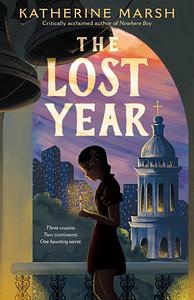Take a photo of a barcode or cover
Read alikes: Blackbird Girls, anything by Jennifer Nielsen, Nowhere Boy, Refugee
Great parallels between Covid and the Ukrainian famine in the 1930s. Loved the unexpected twist and the backstory from the author.
Great parallels between Covid and the Ukrainian famine in the 1930s. Loved the unexpected twist and the backstory from the author.
This was close to a 5-star read for me. It reminded me of [b:Number the Stars|47281|Number the Stars|Lois Lowry|https://i.gr-assets.com/images/S/compressed.photo.goodreads.com/books/1630542426l/47281._SX50_.jpg|2677305] because it includes the story of a girl trying to save another girl from becoming a victim of a historical atrocity.
I listened to the audiobook, which was well done, but felt slow to me at times. I didn't like the Matthew chapters where he was fighting with his mom during the early days of the Covid pandemic. His angst about having his Switch taken away felt extraneous to the main story, which was the 1930s Soviet famine. But I did like Matthew's relationship with GG.
Maybe I missed something because I listened to the audiobook at 1.5x speed, but what is the meaning of the title in relation to the famine? It doesn't make sense to me.
I listened to the audiobook, which was well done, but felt slow to me at times. I didn't like the Matthew chapters where he was fighting with his mom during the early days of the Covid pandemic. His angst about having his Switch taken away felt extraneous to the main story, which was the 1930s Soviet famine. But I did like Matthew's relationship with GG.
Maybe I missed something because I listened to the audiobook at 1.5x speed, but what is the meaning of the title in relation to the famine? It doesn't make sense to me.
dark
emotional
informative
reflective
sad
tense
medium-paced
Plot or Character Driven:
A mix
Strong character development:
Yes
Loveable characters:
Yes
Diverse cast of characters:
No
Flaws of characters a main focus:
Complicated
Fabulous book. The 2020 narrative thread works well to connect the historical threads to kids today, and the author's personal connection to this historical background makes for an emotional, compelling read.
The Lost Year is a particularly challenging read not in terms of its complexity of writing, but the deeply serious subject matter of the past, both recent and distant, combined with current events shaping our world. My mind cannot help but make comparisons to Kristin Hannah's The Nightengale however this novel is considering a different time and place and is meant for the middle school audience. Chapters alternate between three narrators: Matt finds himself in the early months of the Covid-19 pandemic, Helen is in 1930s New York, and Mila is in communist Ukraine under Stalin's rule. When the story begins, Mila has no idea the suffering that is happening beyond Kiev's city limits: the Holodomor, a man-made famine put in place by the government as a means of exerting control over the people and resulting in the deaths of millions of people. Helen, on the other side of the planet, is similarly unaware but questions the reliability of the newspaper when her neighbors have different stories coming from their families begging for help. And Matt has boxes of old documents, a great-grandmother reluctant to discuss anything about her past, and similar feelings of powerlessness at a time when individuals, particularly children, are at the whims of events so much bigger than themselves. This is a must-buy for any middle school historical fiction collection, but again, it is not for the faint of heart.
dark
emotional
sad
slow-paced
Plot or Character Driven:
A mix
Strong character development:
Yes
Loveable characters:
Yes
Diverse cast of characters:
No
Flaws of characters a main focus:
Yes
A very interesting look at the 1930s Ukrainian Famine and the 2020 Covid epidemic through the eyes of children living through them. It is well written but unrelentingly depressing due to the subject matter.
Graphic: Child death
medium-paced
This is a book about the 1933 famine in Ukraine told in alternating perspectives from Mila, the daughter of a Soviet bureaucrat in Kyiv in 1933, Helen, the daughter of a Ukrainian immigrant in New York City in 1933, and Matthew, a boy in 202o helping look after his GG at the beginning of the Covid lockdown. The alternating points of view keep the reader engaged and guessing at where the story is going to go next. Despite changing perspectives, all three voices are clearly defined, giving depth and growth to all three characters. As a reader, I completely felt the emotions all three were going through. Marsh does an excellent job of presenting her 13 year old characters as fully rounded people. She also writes them highly sympathetically. Even though as an adult I understood Matthew's parents, I found myself just as angry with them as he did at times. The story is excellent though it is rather on the nose in a couple of places; I'm not going to complain about it being didactic though as I am well aware the lessons are some that currently need to be explicitly stated.
informative
mysterious
medium-paced
Plot or Character Driven:
Character
Strong character development:
Yes
Loveable characters:
Yes
* Thank you to Macmillan and NetGalley for the ARC, in exchange for my honest review.* 12 yr old Mattie is going stir crazy, stuck in his house and doing online school in the spring of 2020. He's worried about his dad, a reporter working in another country, and upset that he is secluded with his mom and great-grandmother. To keep him busy he is tasked with helping his great-grandmother, GG, go through her old boxes. Reluctant at first, GG completely shuts down once Mattie discovers a photo of two young girls and starts asking questions. Mattie gradually gets GG to open up about her past and allow him to read through the papers and diaries that document the experiences of three girls during the Ukrainian famine of the 1930's: Ukrainian girls Mila and Nadiya, and Ukrainian-American Helen.
The Lost Year is a really compelling novel that tackles a historical event that I'm sure many readers won't know much about. I really enjoyed that through the three girls' different upbringings and experiences the reader got a more global view of this time in history. Helen is living in Brooklyn, where her parents immigrated. She learns about the famine through letters from relatives and through their local Ukrainian community. Reading the news in school she sees how Stalin's lies are being falsely reported, hiding the truth of what was really happening. In Ukraine, Mila's father is a prominent member of the party and she is oblivious to the struggles of people around her, believing in the party line that the people from the countryside are starving because of their own doing. Nadiya is one of those from the countryside, escaping into Kyiv out of desperation and near death from hunger. It allows us to see the effects of total control over the press, both on the citizens of the country in question and to the outside world.
Marsh draws similarities between the Soviet government's denial and lies regarding Ukrainians starving with the American government's misinformation during the COVID-19 pandemic. This comparison is heavy handed at times and verges on preaching but this could be needed for middle grade students who might not have been as aware of the national discourse in spring 2020. It does put this historical event into a context that students can possibly relate to, especially current students who experienced virtual schooling and isolation.
The Lost Year is a really compelling novel that tackles a historical event that I'm sure many readers won't know much about. I really enjoyed that through the three girls' different upbringings and experiences the reader got a more global view of this time in history. Helen is living in Brooklyn, where her parents immigrated. She learns about the famine through letters from relatives and through their local Ukrainian community. Reading the news in school she sees how Stalin's lies are being falsely reported, hiding the truth of what was really happening. In Ukraine, Mila's father is a prominent member of the party and she is oblivious to the struggles of people around her, believing in the party line that the people from the countryside are starving because of their own doing. Nadiya is one of those from the countryside, escaping into Kyiv out of desperation and near death from hunger. It allows us to see the effects of total control over the press, both on the citizens of the country in question and to the outside world.
Marsh draws similarities between the Soviet government's denial and lies regarding Ukrainians starving with the American government's misinformation during the COVID-19 pandemic. This comparison is heavy handed at times and verges on preaching but this could be needed for middle grade students who might not have been as aware of the national discourse in spring 2020. It does put this historical event into a context that students can possibly relate to, especially current students who experienced virtual schooling and isolation.
My favorite way to learn about history is through fiction. As an adult, The Lost Year not only opened my eyes to a time in history I had never heard of, but it emphasized the still-relevant need to discern fact from fiction in media coverage. For middle grade readers, the characters will hook them with needs and conflicts from modern day and the past that, no matter the time period, hit home.








